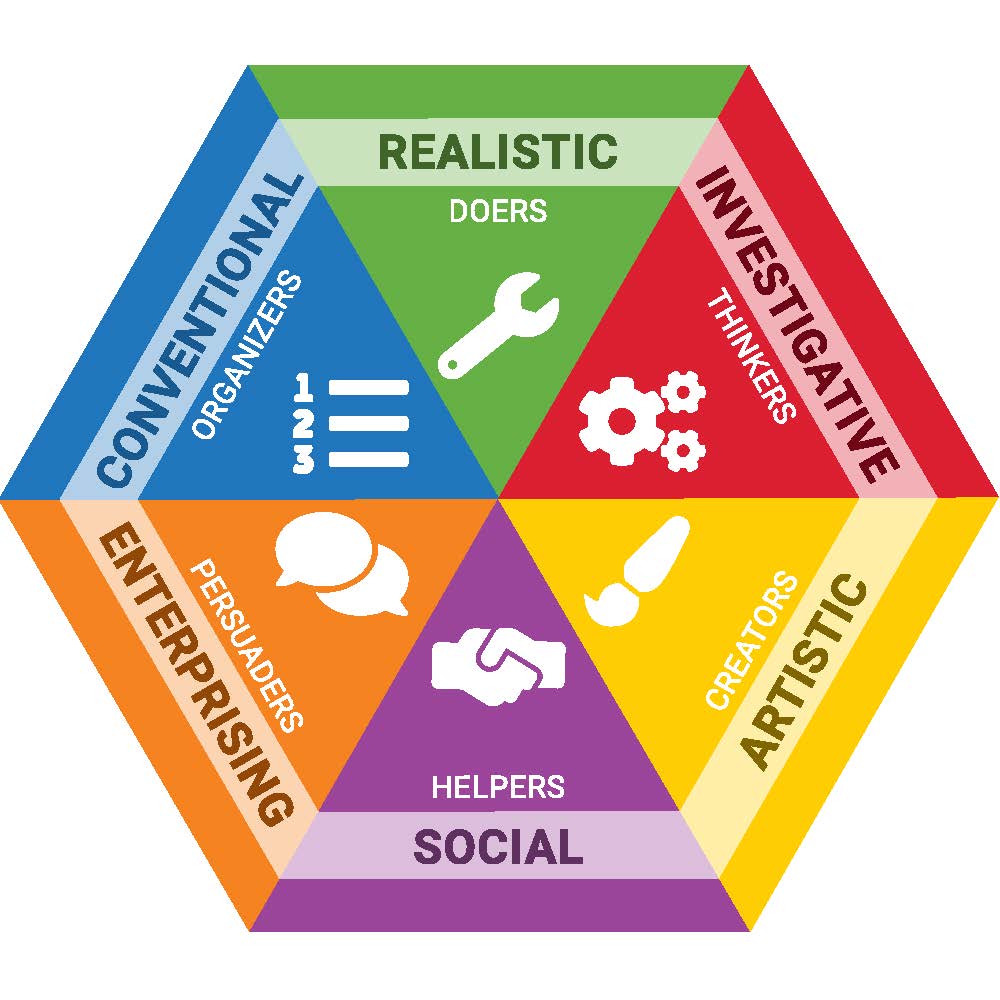Explore Our Assessments
Our self-assessment tools will help you refine your searches, clarify your goals, and discover the best path to achieve them.

Explore a variety of assessments to understand your interests, skills, and
values. Get personalized insights to guide you toward a fulfilling career.
Our self-assessment tools will help you refine your searches, clarify your goals, and discover the best path to achieve them.
Match careers to your goals & interests
Do not use your browser's back button or you will lose your answers.
How to use this feature: You can edit your location and household information on the left. Enter cost information in the boxes or use the sliders to select a desired option.There are 12 categories and a summary is listed on the left. You can edit your answers before completing the assessment.



The National Career Clusters Framework identifies 16 career clusters and related career pathways that are designed to grow career awareness and exploration. Career Clusters are groups of occupations in the same field of work that require similar skills. Each cluster contains several smaller groups called career Pathways that connect to educational programs, industries, and jobs. While a Career Cluster paints a broad picture of a group of occupations, a Pathway helps you focus on and develop a clear, more informed, educational plan over time.
The Career Cluster Match was adapted and produced with permission from the Career Academic Connections Division of the Oklahoma Department of Career Tech. This survey does not make any claims of statistical reliability and has not been normed. It is intended for use as a guidance tool to generate discussion regarding careers and is valid for that purpose.
John Holland suggested that viewing the Interest Areas on a hexagon can help people understand how their interests overlap or how they may be distinctly different. Interests that are most similar are beside each other on the hexagon (e.g., Social, Enterprising, and Conventional). On the other hand, interests across the hexagon from each other (e.g., Conventional and Artistic) are least likely to have similarities. Sometimes people’s combined interests are opposite from or not adjacent to each other. In this case, people sometimes choose to focus on the most different interest as a hobby or to find a unique work setting that merges their interests.

* The O*NET Interest Finder is compatible with Holland's (1985a) Theory of Vocational Personality, one of the most widely accepted approaches to vocational choice. Information for Interest Areas is extracted from the O*NET Career Exploration Tools owned by the U.S. Department of Labor, Employment Training Administration (DOL/ETA). All O*NET Assessment/Counseling Tools are copyrighted. O*NET is a trademark of DOL/ETA.
The Interest Finder measures interests in each of the six Holland RIASEC types.* This section provides definitions for each of the six types. Each definition includes examples of activities that individuals with that interest type like to perform, as well as examples of famous people whose field of work matches the interest type.
People with Realistic interests like work activities that include practical, hands-on problems and solutions. They enjoy dealing with plants, animals, and real-world materials like wood, tools, and machinery. They often enjoy outside work. Often people with Realistic interests do not like occupations that mainly involve doing paperwork or working closely with others. Famous realists: TV carpenter Norm Abram, snowboarder Chloe Kim, and celebrity mechanic Jesse James.
People with Investigative interests like work activities that have to do with ideas and thinking more than with physical activity. They prefer to search for facts and figure out problems mentally rather than to persuade or lead people. Prominent investigators: astrophysicist Neil deGrasse Tyson, primatologist Jane Goodall, mathematician/computer scientist Grace Murray Hopper, and theoretical physicist Steven Hawking.
People with Artistic interests like work activities that deal with the artistic side of things, such as forms, designs, and patterns. They like self-expression in their work. They prefer settings where work can be done without following a clear set of rules. Well-known artists: painter/sculptor Leonardo da Vinci, actress Halle Berry, writer J.K. Rowling, and singers Lady Gaga and Tony Bennett.
People with Social interests like work activities that assist others and promote learning and personal development. They prefer to communicate more than to work with objects, machines, or data. They like to teach, give advice, help, or otherwise be of service to people. Famous helpers: educator Booker T. Washington, mental health care reformer Dorothea Dix, TV psychologist Phil McGraw, and civil rights leader Martin Luther King Jr.
People with Enterprising interests like work activities that have to do with starting up and carrying out projects, especially business ventures. They like persuading and leading people and making decisions. They enjoy taking risks for profit. These people prefer action rather than thought. Prominent persuaders: TV mogul Oprah Winfrey, business magnate Jeff Bezos, and entrepreneur Elon Musk.
People with Conventional interests follow procedures and maintain accurate written and numerical business records. They prefer working in structured settings where roles and tasks are clearly defined. Well-known organizers: businessman J.C. Penney, Supreme Court Justice Sandra Day O’Connor, and professional organizer Alejandra Costello.

